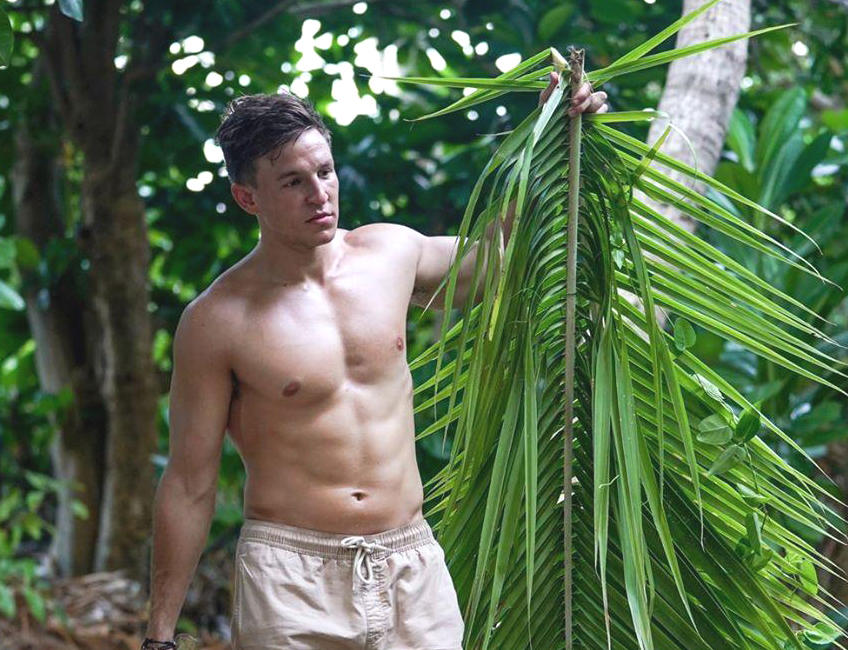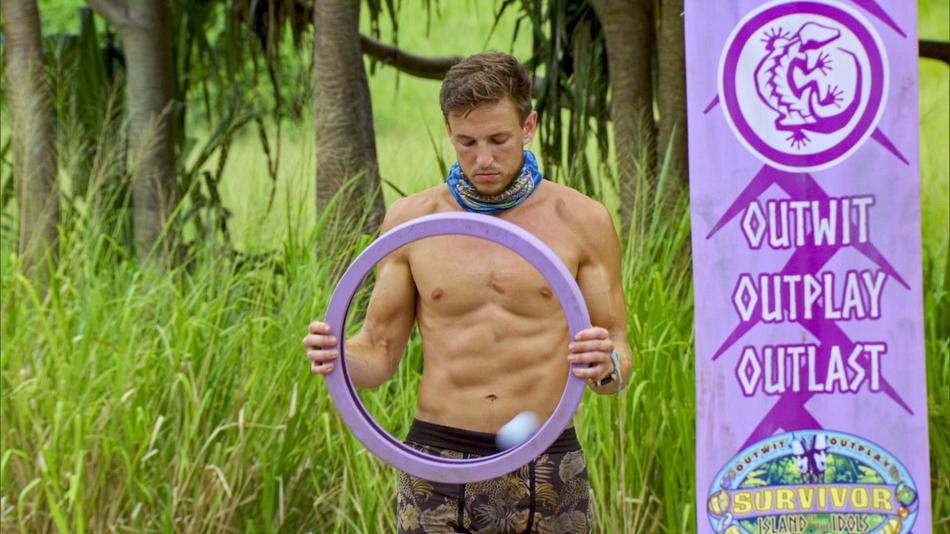In fall 2018, Dean Kowalski ’13CC, who studied economics at Columbia and now works as an advertising sales rep at Google, decided to make a bold move. He auditioned for Survivor, the reality-competition series that plunks everyday people onto a remote tropical island for thirty-nine days of endurance competitions, mind games, and extreme deprivation. Each week a contestant gets voted off by the other players, and the last person standing wins a million-dollar cash prize.
Kowalski’s leap of faith paid off: in December he became runner-up of Survivor’s 39th season, which was filmed last spring in Fiji and aired late last year on CBS. We recently spoke with the New Jersey native about his experiences on the show and how he made it to the final round.
How did you get on Survivor?
First, I had to submit a video introducing myself. I filmed myself walking with my phone in selfie mode on the street in Chelsea and was like, “hey guys, I’m Dean Kowalski, I’m twenty-eight, I live in New York City, and here’s why I’m going to outwit, outplay, and outlast on Survivor.” I went up to random New Yorkers, like a construction worker and a pizza guy, and asked them on camera why they thought I’d win. I guess it turned out to be a good video because I heard back the same day from the casting department and went on to the interview round.
How did you prepare for the competition?
I trained for the endurance challenges by doing yoga, practicing balancing, and holding weights and uncomfortable positions for long periods of time. I knew we’d have little food on the island, so I tried to get my body used to hunger and only eat between the hours of noon and 8 p.m. To prepare for the many puzzle challenges I practiced crosswords, slide puzzles, and Sudoku. I also watched past seasons of the show to get a sense of the strategy involved.
How were the living conditions on the island?
I initially thought the show was a farce, that we would go out to the island and there would be emergency granola bars and basic amenities. But it wasn’t like that — there were no showers, no bathrooms, no deodorant, no toothpaste, and only rice and coconuts to eat. The only things people were allowed to bring were medical supplies, including contacts. And we were given bug spray and sunscreen. But that’s it.
The conditions were absolutely miserable. Simply getting a decent night’s sleep was a struggle. At first we built a bamboo mattress to avoid “creepy crawlies” like rats and crabs, but it was too uncomfortable. We ended up sleeping in the dirt.
People watching the show see the sunshine in Fiji; in reality it can be freezing at night, and the rain was the most difficult thing I’ve ever had to deal with. Despite our best efforts at building a waterproof shelter, there would always be rain coming through; sometimes it was just one drop at a time, like Chinese water torture. I hit the lowest points of my twenty-nine years of living when it was pouring outside. On top of that, the firewood would get soaking wet, so we couldn’t make fires or cook rice. We were stuck with coconuts, and what people don’t realize is that coconuts are a natural laxative. We learned very quickly that if you have more than two or three of them in a day you will have extreme stomach pain.
What was your competition strategy?
In the beginning, I intentionally did poorly in the challenges so that I wouldn’t be seen as a threat, and therefore nobody would vote me out. I tried to not be the most athletic, social, well-liked, and aggressively strategic person there, because that’s how you stand out and become a target. I subdued all of those qualities until we hit the final weeks of the competition and I kicked everything into full gear.
I also completely hid from everyone the fact that I went to Columbia and played Division 1 basketball and that I worked for Google. I didn’t want people to be on high alert and think, “this guy is smart, he’s going to be strategic and come after us, we need to get him out.” I made up a backstory that excluded those things. Overall, I’m proud of how I executed it all.
Can you describe the challenges?
Early on, all of them were team-focused — relay races involving physical obstacle courses that would culminate in puzzles. Later, as more people got eliminated, most of the challenges were individual. Those ones were probably the hardest for me. They were focused on strength and endurance; you’d sometimes have to stay in a static pose and hold an object for a long period of time.
There was a particularly tough challenge where we each had to hold onto a rope with both hands behind us while standing over a platform ledge about ten feet over the ocean. The ropes were attached to a pulley system controlled by Jeff Probst, the Survivor host, and every five minutes he would let the ropes slacken more. Eventually our heads and torsos were almost parallel to the water. We just had to hold on because once you let go, you fall into the water and lose the challenge.
Did you tell people you were filming the show?
I spilled the beans by publishing a clip from my application video on Instagram back in September 2018. So everyone knew. Once I got chosen, my manager and HR department ended up being extremely supportive and letting me take a leave of absence, which was awesome.
What was it like to be filmed all day and night?
To be honest, you get used to it very quickly. At the beginning of the show, you try to watch what you’re saying around the crews, and then after a while, you say anything. They don’t really interact with you; they’re just kind of there, and they become part of the whole experience.
Did you get a cash prize as the runner-up?
Yeah, everyone gets prizes for participating. There’s a sliding scale of prize money based on when you get voted out. As the runner-up, I got a hundred thousand dollars. It was a nice payday, but to be honest the experience would have been worth it without it.
Do people recognize you in public now?
Not like I’m Derek Jeter, but yes, I’ve been stopped plenty of times — while snowboarding in Colorado, at the airport, at the grocery store, on the street. Luckily, everyone who comes up says nice things, like “you got robbed” or “you did amazing.” Kids have come up to me asking for photos. It’s been fun, but I’m taking it in stride because I know that by the time a new season is out it will be old news.
What’s your biggest takeaway from being on the show?
It was an amazing experience, even though it was at times overwhelming. I found it so rewarding to disconnect from everything and live off the land. It made me feel so grateful for all that I have — working at Google, going to Columbia, having a loving family, living in New York City. There were times when I was out there on the island and it’d be pouring rain and all I wanted was to have warm clothes and a roof over my head. It’s easy to forget those moments once you come back to society and are indoors and you have snacks at work and can text your mom at any time. But I try to not lose sight of how valuable such simple comforts are now.




